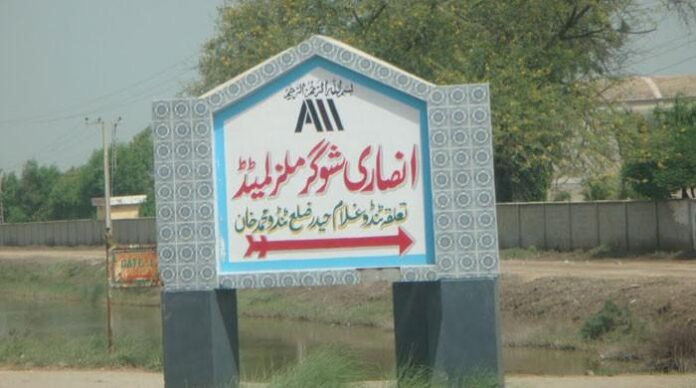What do you do as a company if your CEO is sitting in jail? And what if your CEO then decides to sue you?
This hypothetical is not one many companies to face. And yet, Ansari Sugar Mills, a company incorporated on July 9, 1989, and which manufactures and sells white sugar, is having to face this problem. That is because their CEO is none other than Anver Majid.
If you are wondering why this name sounds familiar, it is because Anver Majid was heavily referenced in the infamous ‘fake accounts’ case of former president Asif Ali Zardari, where the Joint Investigation Team (JIT) of several law enforcement agencies and the military accused Zardari and his friends of setting up multiple accounts not in his name to conduct money laundering.
To recap: in 2015, the Federal Investigation Agency (FIA) started an investigation of four suspicious accounts in Summit Bank, which went on until 2018. The Supreme Court took suo motu notice, and ordered a joint investigation team (JIT) to investigate, which went through roughly 11,500 bank accounts. In the final JIT report issued in December 2018, the JIT implicated President Asif Ali Zardari, and also Anver Majid.
According to the report, Anver Majid and his family took bribes and managed Zaradr’s money laundering. In exchange, the Omni Group – a conglomerate that owns several companies and, among other things, controls an absurdly large proportion of Pakistan’s sugar manufacturing companies, owned by Anver Majid – benefitted, and jumping from six companies in 2007, to 83 companies by 2018, with most of the expansion coinciding with Zardari’s presidency (2008-2013).
According to the JIT, most of these companies acted as shell companies, and as a front group for Zardari himself. According to documents compiled by the JIT, between 2007 and 2018, Zardari and his family members declared a taxable income of Rs1.64 billion, while declaring personal assets valued at Rs7.74 billion.
Meanwhile, some of the money from the fake accounts was used for Anver Majid’s family. The JIT said that Rs11.12 million were paid to renovate Anver Majid’s home. Similarly, some money was used to renovate clothing boutique ‘Menahil and Mehreen’ in the upscale Clifton neighbourhood of Karachi, owned by Anver Majid’s daughter-in-law.
Ok, so that is who Anver Majid (at least according to the JIT). Anver Majid was arrested in August 2018, and has been in jail or out on bail for health reasons since then. Just last week, the Chief Justice of Pakistan Gulzar Ahmed constituted a bench to hear the case of Anver Majid v. National Accountability Bureau.
You would think that Majid would have other things to worry about in jail. Yet in January 2020, Majid found out that the company was going to hold an annual general meeting (AGM) of its shareholders, and subsequently sued the company in February 2020. Majid actually is not only the CEO, but he is also a director and holds 51.3% of shares in the company.
The legal notice drafted by his lawyers stated ‘the defendant [Ansari Sugar Mills] is going to take unlawful, illegal, arbitrary decisions in the proposed AGM of the [fiscal] year 2020, hence this suit.” Furthermore, the company was taking advantage of the fact that Majid was behind bars, and conducting an AGM without prior notice to Majid, which was a mandatory requirement. A stay order was issued by the court, which prohibited Ansari Sugar Mills from holding the AGM.
In effect, Anver Majid is not willing to cede control of the company he owns – legitimately or otherwise – even from his jail cell. Ordinarily, one would expect a company to appoint a new CEO in the absence of the old CEO, particularly if the absence is caused by the imprisonment of the aforementioned CEO on account of an investigation into one of the biggest corruption scandals in the country’s history.
One might even expect the Securities and Exchanges Commission (SECP) to require the appointment of at least an interim CEO while the investigation is ongoing so as to protect the interests of the minority shareholders. As of this writing, that does not appear to have happened. The SECP is also named as a co-defendent in Anver Majid’s lawsuit, so it is possible that they are prevented from taking further action until the Sindh High Court’s stay order is lifted.
That stay order has been in place since February 2020. In a notice to the Pakistan Stock Exchange on August 24, the company informed the PSX that it could not hold the AGM. “We hope you understand our position regarding non-submission of the accounts, which is not intentional or deliberate… keeping in view the peculiar circumstances of the company.”
That is why the last annual report publicly available is from 2017, and the last financial report is from June 30, 2018.
Up until that period, the company had done well, reporting a profit after taxation from 2014 to 2017. In the quarter ending June 30, 2018, the company reported a pre-tax profit of Rs83.6 million, up from Rs80.3 million in the same quarter the previous year. For the year ending September 2017, the company crushed 425,803 million tonnes of sugarcane, and produced 41,304 million tonnes of sugar.
“The season in terms of cane supply, recovery and plant capacity utilization is extremely favourable. Ansari’s sugar production is expected to be higher this year…the management anticipate good operating and financial results for the full year of 2017-18.” the director’s report optimistically noted.
Well, so much for that. The company is now entangled in the drama of its CEO, and stuck in limbo for the foreseeable future.
And just in case you thought the JIT had not noticed Ansari Sugar Mills: it did. In its report it said that Ansari Sugar Mills has 18 complaints pending against it in the Sindh Abadgar Board, a semi-autinomous body meant to protect the interests of farmers in Sindh, with allegations that it had not paid up to Rs11.2 million to sugarcane farmers. Furthermore, the JIT accused the mill of having unexplained income reflecting money laundering to the tune of Rs1,072 million.
























